how to become a physician assistant
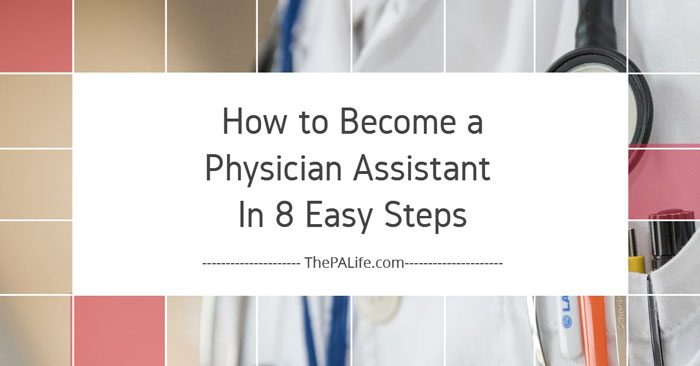
So, you want to become a physician assistant?
Congratulations, you have taken the first step on a lifelong journey filled with many joy's, significant struggles and a lifetime of free pastries.
Becoming a PA is relatively straightforward:
- Complete the required prerequisites and healthcare experience
- Apply to and be accepted to any one of the of 265+ US physician assistant programs
- Pass your PANCE (Physician Assistant National Certification Exam)
- Find a job and complete the licensure paperwork in your state of practice
The timeline for becoming a PA can be as little as five years from the time you leave high school if you enter a direct entry PA program. But, for the clear majority, it's more like 8-9 years.
- Undergraduate degree program: 4 - 6 years
- Healthcare experience: 2-3 years
- PA school 2-3 years
Of course, the process of getting there is much more nuanced.
Here are the eight steps you need to take to become a physician assistant:
Step 1: Identify Your PA Passion
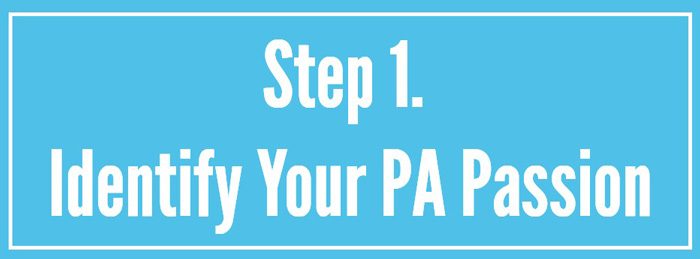
Why do you want to be a physician assistant?
In the "old days," it may have been enough to want to be a PA "just because." You were looking for a job in the medical field that combined reasonable hours, good pay, and a lot of autonomy.
But nowadays you can't just be "a little bit in." You have to be full on PA fanatical. Meaning you need not only have a firm understanding of what PAs do and how they fit into the complex ecosystem of healthcare delivery, but you also must develop a proven track record that indicates without any reasonable doubt that this is the profession for you.
How do you do this? You must place yourself close to actual working PAs, you must be willing to roll up your sleeves and get your hands dirty, and you must become the definition of human compassion.
No matter where you are on this journey, whether you are a high school student dreaming of a bigger future, a college student completing your undergraduate degree, a married mother of two seeking a new career in medicine, or a recent college graduate, you MUST make this your number one priority.
When I was completing my undergraduate degree at the University of Washington, I came across a physician assistant while working in the student health center as a medical records clerk. I was premed at the time (something I have discussed before on this blog). Meeting a PA was a real game-changer for me.
The point here though is less about my meeting a PA and more about where I was at the time that I was able to work with one in the first place.
People ask me all the time "Stephen, how do I know if want to be a physician assistant?" "How do I find healthcare experience?" Or "how do I find PAs to shadow?" These are all reasonable questions, but the answer is quite simple:
You walk out your door with a smile on your face, and you get to work!
Which brings me to step number two:
Step 2: Get off your butt and start working in a healthcare field and in your community

You will never know if the PA profession is right for you unless you are working in healthcare.
There are many ways to do this, and yes, it may require some work on your behalf, but it's no skin off your back. You want to be a PA, you love patients, and you will do anything to make people's lives better. Right?
A lot of people have a lot of excuses as to why they "can't get healthcare experience." But the majority of this is just laziness.
Nobody cares that you have a full load of college courses, or if that CNA degree program conflicts with your spin class, or if you are working a full-time job, or if your car broke down last week, or any of the other five million excuses I hear as to why people can't get healthcare experience hours.
Personally, the day I knew I wanted to be a PA is the day I started working my ass off to become one.
And so should you.
Start working and serving in organizations within your community that help people: Food kitchens, youth summer programs, health support at local races, crisis lines, needle exchanges, churches, health fairs, senior service agencies, hospitals, daycares, homeless health centers, trash pickup, nursing homes, meals on wheels, etc. etc. etc. You name it; you should be there bright eyed and bushy tailed ready to lend a helping hand.
If you are the type of person who likes to hold a medical certificate, take a 1-2-month night or summer program and obtain your certification (Step 6).
I started working immediately even before college. I remember grabbing a sheet of paper from my high school's student job board which led to a paid opportunity helping elderly home-bound families in my community. I worked at Burger King the summer before college and was part of a community organization that taught recycling to elementary schools across the county. When I went to college, I walked directly into the student health center and offered my services - paid or not. Sensing a good deal, they immediately gave me a job in medical records for a couple of hours a day. After one year they needed help in the laboratory, so they trained me to be a phlebotomist, which led to me making connections throughout the entire University healthcare system which led to a few reference letters and eventually to my PA school acceptance.
- I took night classes and received my EMT certification and even sat for an interview for The Seattle Fire Department.
- I worked for two years after college for the mobile unit of The Puget Sound Blood Center. After six months I was already working as a supervisor.
- I got my CPR and BLS certifications.
- I received my phlebotomy certification.
Do anything and everything you can to get healthcare experience. You need a no-excuses mindset. If you aren't getting health care experience, it's your fault. So get started now.
Step 3: Create a CASPA Account Today

I could probably move this up to step number one.
There is no penalty for creating a CASPA account early. CASPA is the Central Application Service for Physician Assistants and creating an account is free and will provide you with an essential framework for your PA journey.
You can add/remove PA schools from across the country to get a sneak peek on prerequisite requirements, gain a valuable understanding of additional documents that may be required, see what questions PA schools are asking and create a structure for your application.
Simply put, the earlier you understand and familiarize yourself with CASPA the better!
So, don't wait, if you haven't already, create an account today.
Step 4: Work Your Ass Off and Crush your Prerequisites

OK, let me say one thing quickly here.
I am not a straight A student, and you certainly don't have to be. So, don't go saying to yourself "well I am just not smart enough," or "I have bad grades, and I will never get into PA school."
Trust me I get it, let's flashback to my sophomore year in college when my guidance counselor told me straight up that I had no future in medicine.
I won't lie, this led to a serious period of self-reflection, depression and eventually redirection. But I regrouped, dusted off my inner confidence, found a new guidance counselor, changed my major and hit go. Then I crushed it.
Take that evil guidance counselor!
The point is: anything worth doing in life is going to be hard. Maybe you are one of the lucky few, and you were born with a photographic memory, so test taking is a breeze. Perhaps you are gifted with social skills; maybe you are just a really hard worker, maybe you are radiating human kindness. Whatever your special skill is, identify it early and exploit the hell out of it.
My skill is that I can endure a tremendous amount of suffering, I care deeply about humanity, and I have a killer smile 😃. So I have had to align myself with people who value these traits. Some PA schools say to hell with community college and will only accept students with a 3.75 GPA and four-year university coursework. Not for me! But, maybe this works well for the student with the photographic memory. So, you must find schools and people who align with your core values. Seek them out, and your path to PA school will straighten.
Oh yes, I almost forgot, you MUST COMPLETE ALL OF THE REQUIRED PREREQUISITES to become a competitive applicant at the schools for which you wish to apply. Yep, all of them, not some of them, not just the ones you like, but ALL of them. And, you CAN NOT take the easy route. Which means if they require Biology 1 you take Biology 3, if they don't require a Spanish elective, you become bilingual and work in a healthcare center treating farmworkers in your community.
Aim high, even if it takes you out of your comfort zone, do your best, and you will be a better applicant because of it.
Step 5: Join Professional Organizations

If you are not, at a minimum, a member of the AAPA and your state PA society shame on you.
So, if you are not a member, stop what you are doing right now and join. The icing on the cake is that this is the only time in your life that these memberships will be affordable so take advantage of it while you can. Trust me, once you are a practicing PA the $300 plus membership fee will make you yearn for the days of old.
- AAPA affiliate memberships ($100/year)
- State PA Chapter (about $30)
- Physician Assistants for Global Health ($15)
- Physicians for a National Health Program
- Subscribe to the PAEA Journal
On the same note, you should attend the annual conferences offered by these institutions. They will be offered at a reduced price as part of your membership, and it is a wonderful way to network.
Step 6: Get a Certificate (or three)

I mentioned this briefly in step three because, for many, part of gaining healthcare experience is getting a certificate that will make you a productive member of a healthcare team.
Many of these training programs can be completed within a matter of months/days. Also, the tuition can be relatively inexpensive if you complete the training program at a community college, state-funded technical school, or adult education program. Beware of the for-profit entities that charge $15,000+ for the same CNA or MA training you would be able to obtain at a fraction of the cost elsewhere.
- You should undoubtedly complete your BLS/CPR training
- Consider stepping up your game and becoming ACLS and PALS certified
- Become HIPPA certified ($29 online)
More advanced certificates:
- Restorative Nurse Assistant Certificate of Competency ($100) 16 hours: Allows you to work as a physical and occupational therapist in the skilled nursing home
- Pharmacy Technician Program ($1,000)
- Emergency medical technician ($1,100). Here is the course I took at North Seattle Community College back in the day.
- Take an EKG Technical certification program ($1,000)
- Phlebotomy certification can often be obtained in 1-2 months
- Take a Medical Terminology Course and receive a certificate of competency ($150)
- Certified nursing assistant (CNA) or medical assistant (MA)
- Become a certified medical scribe
- Become Red Cross Licensed Training Provider
Here is an example of what is available in my area through the Pajaro adult education department in Santa Cruz County, CA. You can find similar opportunities in your region by performing a Google search for "EMT courses near me community college," or "Certified Nursing Assistant course near me adult school." Search and refine until you find affordable options that offer a timeframe and hours that will fit with your schedule.
I received most of my training on the job, so you don't have to wait to complete a certification program to begin working. At my current office, only a few of my non-PA/MD/NP colleagues have medical certificates. Those that don't have been trained on the spot. This is the case for our two medical scribes and surgery room assistants, both who intend to apply to PA school.
Step 7: Apply to PA School

Everything you have likely read online makes the CASPA application seem like an insurmountable beast of an opponent. But completing your CASPA application won't be hard if you have taken the steps outlined in this blog post. Surprise, you have everything you need to apply to PA school!
You made it here because you found your PA passion. And because of this burning desire obtaining healthcare experience hours and completing the necessary prerequisite coursework was just a natural byproduct of your innate drive. In other words, you got to do what you love, and you succeeded because of it.
You have been working in the medical profession, so you have made invaluable connections. People trust you, and they are eager to say how much they love you by providing three exceptional letters of recommendation.
If it was required you prepared for and took the GRE.
You have shadowed several PAs because you work with a couple of them in your current clinical setting. You bought them each a cup of coffee and took them out for lunch while you picked their brain. You sought PAs out in every capacity.
Now, let's look at the CASPA application. It is divided into four sections (but you already knew that right?).
1. Personal information (7 sections)
- Biographic information
- Contact information
- Citizenship Information
- Race and Ethnicity
- Other information
- Family Information
- Environmental Factors
2. Academic history (4 sections)
- High School Attended
- Colleges Attended
- Transcript Entry
- Standardized Tests: GRE, MCAT, TOEFL (if necessary)
3. Supporting information (7 sections)
- Evaluations: You must have a minimum of 3 requested evaluations to submit your application. You may enter a maximum of 5.
- Experiences: List employment, internships and volunteer experiences.
- Achievements: List of awards, honors, and scholarships.
- Licenses and Certifications
- Essay
- Release Statement
- Memberships
4. Program Materials (will be dependent on the schools and how many you applied to)
- University 1:
- Documents: CV/Resume, Catalog Course Description, License, Military papers, Other, Publication, shadowing/healthcare hours
- Prerequisites
- Questions (2000 characters each)
- How has your approach to your academic coursework prepared you to be a successful PA student?
- Describe your greatest strength and your greatest weakness as it pertains to becoming a PA student and a graduate PA.
- Describe your exposure to PAs in clinical practice.
- Do you speak fluently another language in addition to English? If yes, please list.
- Why did you choose to apply to the RBHS - SHP PA Program?
- If you are reapplying to Rutgers PA Program, what is different about your candidacy since the last time you applied?
- University 2:
- Documents
- Prerequisites
- Questions (yes or no)
- Have you completed a minimum of 50 hours directly shadowing a Physician Assistant?
- Have you completed a minimum of 250 hours observing or participating in the delivery of healthcare in a clinical environment?
- Have you applied to Lake Erie College's Physician Assistant Program in previous application cycles?
- University 3:
- Documents: CV/Resume, Military Papers, Catalog Course Description
- Prerequisites
- Questions:
- Have you ever applied to the Drexel University PA program in a previous application cycle?
- If you answered Yes to the above question, in which previous application cycle(s) did you apply? Select all that apply.
Many schools require supplemental materials. If you have followed the steps above answering any additional question and providing extra information will be easy peasy lemon squeezy.
And if you are wondering about your PA school essay, it will only be as good as the experiences that got you to this point. These experiences are meaningful and profound. Your life is no less impressive than the person sitting next to you. Writing an essay is as simple as being mindfully aware of what has gotten you to this point: your achievements, struggles, background, and experiences. Most importantly how all of this answers your "why" of becoming a physician assistant.
And if you still need some help with your PA school essay consider hiring my team of experienced professionals to tie it all together for you.
Step 8: Be Yourself and Nail Your Interview
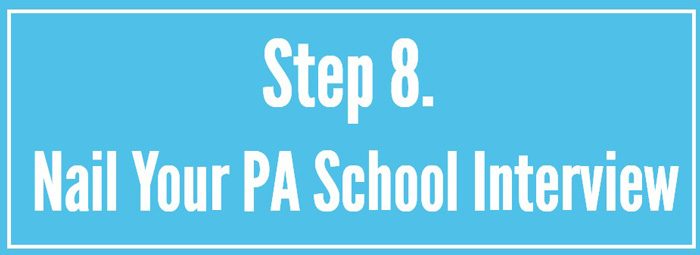
The day before my PA school interview I made a journey from Albany to New York Pennsylvania Station and then to NJ on a southbound transit train in zero degree weather in the heart of a rough East Coast winter.
It was my second time to NY City, and when I stepped out of Penn station into the heart of Manhattan and into Times Square, I was offered a seat to attend the Late Show with David Letterman. How's that for a friendly welcome to the City! I took the free seat without hesitation.
These were the days before Uber and cell phones, so after the show, I stumbled my way back to the transit center and boarded a bus to Piscataway NJ where I was scheduled to have an early morning interview at Rutgers. I found my hotel room and tried to get some sleep, which of course I didn't.
Upon arrival at Rutgers PA Program HQ, I was greeted by an enthusiastic group of PA students and 20 or so applicants. We assembled into a room and mingled for about an hour until my name was called. I was then escorted into another room with three friendly PA school faculty eager to ask me questions.
Remember, the purpose of every step of your journey up to this point has been to prepare you for the day of your interview. Interviews are only as hard as whatever weakness you are trying to cover up.
Over the years, I have found that my ability to interview successfully has very little to do with the interview itself and a lot more to do with how much I understand and believe in the topic I am being interviewed about.
How much do you believe you want to be a PA?
This should be an easy question to answer. It is reflected 100% in how many HCE hours you have accumulated, how many PAs you have shadowed, what kind of letters of recommendation you have, your GPA, GRE scores and volunteer experiences. It is reflected in your smile, your handshake, and your enthusiasm to be there.
When they ask you "what kind of stress do you see associated with the PA profession?" Well, you have worked alongside PAs for years, you have shadowed PAs, you understand what they do and what their day looks like. The answer is an easy one.
When they ask you "what have you done to increase your chances of being accepted into our PA program?" You can't wait to tell them about your experiences working in the homeless health service center; the nights spent taking extra classes to make up for a couple of bad undergraduate grades, and the work you do as a volunteer with the Crisis Text Line.
When you are asked to "describe an interaction you had with a patient that made an impact on you," Maria Gutierrez immediately comes to mind. You remember how this 90-year-old mother of 10 would come to your office every month for her INR check. You remember how she would take your hand and wish that God would bless you. You remember how much you loved her smile and the generations of family that would come with her to each visit. You illustrate how through her grace she has taught you about what is important in life.
Books on interviews remind us that "the admissions committee selects candidates on the basis of emotion (likability, credibility, and trust) and justifies that decision with the facts (GPA, GRE scores, and medical experience)."
You see, you can sit and read for hours about how to be likable, credible, and trustworthy. How to dress for impact, and how you should smile at your PA school interview. But you will not need to worry about any of this if you have a real passion and desire to serve.
You can't fake a service mindset, even when covered by layers of nervousness and baggy eyes from a lack of sleep and jitters from way too much coffee and that brown spot from the coffee you spilled on your tie accidentally on your way to the interview. You can't fake years of hard work and determination. The good news is: you don't have too.
Celebrate Your Success

Whether you're a first-time applicant or a reapplicant, these eight steps are a blueprint for mastering the application process.
The reason becoming a PA is now more competitive than ever is because the word got out. PAs holds a sacred place in healthcare. And very similar to becoming a doctor, as a PA, you will be one of the most integral parts of a patient's care and recovery. But just remember, the nurses will still get more flowers and pastries and don't touch their pastries unless you have been told to do so.
I have never regretted my decision to become a PA, and I know you won't either.
If you need help any step of the way, drop me a line. We offer many services to help you wherever you may find yourself on the journey.
With your passion, commitment, motivation, and patience, you will soon rise to the top of the applicant pool much faster than if you go it alone. You'll become a much more confident applicant, you'll get more interviews, and you'll be a Physician Assistant Student (PA-S) before you know it.
- Stephen
Our Services
Whether you a perfecting your PA school application essay, finalizing your resume/cv, preparing for your first PA school interview, or studying for your PANCE or PANRE board exam, I have put together a collection of services to fit every budget and an ever-growing number of needs.
[genesis_column size="one-half" position="first"]
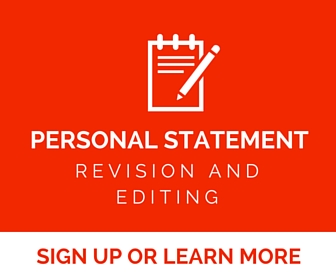
Essay Editing
[/genesis_column]
[genesis_column size="one-half"]
Resume Templates
[/genesis_column]
[genesis_column size="one-half" position="first"]

Free Practice Exams
[/genesis_column]
[genesis_column size="one-half"]
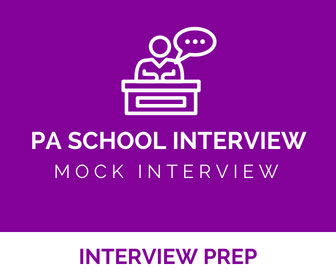
Mock Interviews
[/genesis_column]
[gb_clear]
You have Successfully Subscribed!
 Schedule a Live Recorded PA School Video Interview
Schedule a Live Recorded PA School Video Interview
We offer 60-minute mock PA school interviews with post-interview feedback and advice. Includes a recorded video of your interview that you can watch, download, or share with family and friends. There is no better way to prepare!
Schedule an Interview
how to become a physician assistant
Source: https://www.thepalife.com/how-to-become-a-physician-assistant-in-8-simple-steps/
Posted by: mathisgicence.blogspot.com

0 Response to "how to become a physician assistant"
Post a Comment